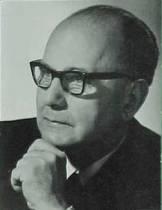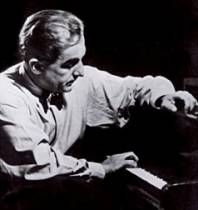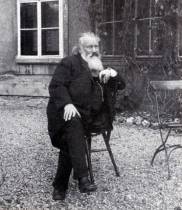
Hans Swarowsky (September 16, 1899 – September 10, 1975) studied music in Vienna: theory and composition with Schoenberg and Webern, conducting with Clemens Krauss, Richard Strauss and Felix Weingartner, and piano with Eduard Steuermann, as well as with Busoni. He then held a succession of conducting posts in various opera houses across Europe: Stuttgart, Hamburg (from 1932) and Berlin (from 1934), but was banned from conducting in Germany by the Nazi government between 1936 and 1945. As a result he conducted abroad, with the Zürich Opera from 1937 to 1940 and with the Polish Philharmonic Orchestra in Kraków during 1944, and worked in opera management in Munich and with the Salzburg Festival, as well as assisting Richard Strauss on the libretto of his final opera, Capriccio. Following the end of World War II he conducted Richard Strauss’s Der Rosenkavalier at the 1946 Salzburg Festival, and served as conductor of the Vienna Symphony Orchestra between 1946 and 1948. From 1948 to 1950 he was chief conductor of the Graz Opera and during the early 1950s he was active as a guest conductor and in the recording studios of Vienna. Swarowsky was appointed permanent conductor at the Vienna State Opera by Herbert von Karajan in 1957 and remained active in this opera house until his death, offering stylish and faithful performances of the core repertoire. He succeeded his fellow Schoenberg pupil Karl Rankl as chief conductor of the Scottish National Orchestra (1957–1959). From 1946 he led the conducting class at the Vienna Academy of Music, his students including many of the major figures of the generation which made its mark during the 1960s and 1970s, such as Claudio Abbado, Adam and Iván Fischer, Mariss Jansons, Jesús Lopez-Cobos, Zubin Mehta, Peter Schneider and Giuseppe Sinopoli. Swarowsky recorded extensively for many minor budget labels, such as Audio Fidelity, Concert Hall, the Haydn Society, Supraphon, Urania, Vanguard, and Vox, often with the Orchestra of the Vienna State Opera and the Vienna Symphony Orchestra (also known for contractual reasons as the Pro Musica Symphony Orchestra of Vienna), as well as for the American Recording Society’s series Music Treasures of the World, which was sold in American grocery shops with anonymous performer attributions. In addition the German conductor, record producer and entrepreneur Alfred Scholz falsely attributed to Swarowsky, who had taught him conducting, numerous recordings (for instance of Bruckner symphonies) with the South German Philharmonic Orchestra, a recording orchestra made up largely of musicians from Prague and Bamberg. To confuse matters, Swarowsky did actually make several legitimate recordings with this orchestra, for instance complete accounts of Wagner’s Lohengrin and Der Ring des Nibelungen, during the Czech-Russian crisis of 1968. Thus Swarowsky’s reputation has suffered through his association with inexpensive records, generally available at the bottom end of the market, and in certain cases with recordings which he in fact did not himself conduct. 
Friedrich Wührer (Vienna, June 29, 1900 - Mannheim, December 27, 1975) was an Austrian-German pianist and piano pedagogue. He was a close associate of and advocate for composer Franz Schmidt, whose music he edited and, in the case of the works for left hand alone, revised for performance with two hands; he also was a champion of the Second Viennese School and other composers of the early 20th century. His recorded legacy, however, centers around German romantic literature, particularly the music of Franz Schubert. Wührer began piano study at age six with Marius Szudelsky; after entering the Vienna Academy in 1915, Wührer continued studying piano with Franz Schmidt and took courses in conducting under Ferdinand Löwe and music theory under Joseph Marx. His performing career began in the early 1920s, and he toured Europe and the United States in 1923. From his early days a champion of modern music, Wührer, was a founder of the International Society for Contemporary Music in Vienna. He formed friendships with composers Hans Pfitzner and Max Reger, and he became associated with Arnold Schönberg and his circle, participating in noted performances of Schönberg's setting of 15 poems from Das Buch der hängenden Gärten, op. 15; his Pierrot Lunaire as part of a touring company presenting the work in Spain; and Webern's Pieces for Cello and Piano, op. 11. Wührer also performed music by Béla Bartók, Igor Stravinsky, Sergei Prokofiev, and Paul Hindemith, and on July 3, 1930 he performed Schönberg student Paul Pisk's Suite for Piano in the first broadcast of that composer's music by the British Broadcasting Corporation. Wührer made his Salzburg Festival debut in 1938, and in 1939, as Paul Wittgenstein, who commissioned the work, had fled Austria, Wührer performed in the premiere of Schmidt's Quintet for piano, violin, clarinet, viola, and cello in A major, albeit in his own arrangement for two hands rather than as originally written for piano, left hand alone. For some years thereafter, Wührer performed all the Schmidt left hand literature in his own two-hand arrangements. He and Wittgenstein viewed each other with animosity; Wittgenstein accused Wührer of being an enthusiastic Nazi who later tried to cover his tracks, and Wührer disparaged Wittgenstein's personality and pianism. Whether for this or some other reason, the recital programmes did not, as Wührer had promised Wittgenstein, make any note of the latter's exclusive rights to the works, and as a descendent of Jews Wittgenstein had no recourse in Nazi-governed countries. Wührer continued his advocacy for modern works at least into middle age. For instance, he gave the premiere of Pfitzner's Sechs Studien für das Pianoforte, op. 51, of which he was the dedicatee, shortly after its composition in 1943 and in the 1950s he performed the Piano Concerto, op. 21 written in 1939 by Kurt Hessenberg. Nonetheless, notwithstanding his pioneering work for music of the Second Viennese School and other moderns of his day, Wührer's principal focus as a performer, his posthumous reputation, and his recorded legacy came to rest on performances of music from the romantic era, particularly works in the German and Austrian traditions. Later in life, Wührer was a juror at the Second Van Cliburn International Piano Competition of September 26-October 9, 1966, which awarded first prize to Radu Lupu, and a member of the piano jury at the 1968 Queen Elisabeth International Music Competition. Wührer's son, also named Friedrich, was a violinist and conductor who made classical records. 
Johannes Brahms Concerto for Piano no 1 in D minor, Op. 15 Friedrich Wührer, piano Vienna State Opera Orchestra Hans Swarowsky 1953 |

